-
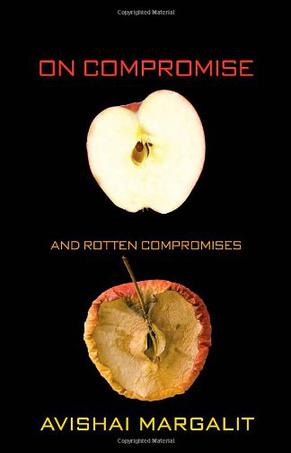
On Compromise and Rotten Compromises
When is political compromise acceptable--and when is it fundamentally rotten, something we should never accept, come what may? What if a rotten compromise is politically necessary? Compromise is a great political virtue, especially for the sake of peace. But, as Avishai Margalit argues, there are moral limits to acceptable compromise even for peace. But just what are those limits? At what point does peace secured with compromise become unjust? Focusing attention on vitally important questions that have received surprisingly little attention, Margalit argues that we should be concerned not only with what makes a just war, but also with what kind of compromise allows for a just peace. Examining a wide range of examples, including the Munich Agreement, the Yalta Conference, and Arab-Israeli peace negotiations, Margalit provides a searching examination of the nature of political compromise in its various forms. Combining philosophy, politics, and history, and written in a vivid and accessible style, On Compromise and Rotten Compromises is full of surprising new insights about war, peace, justice, and sectarianism. -
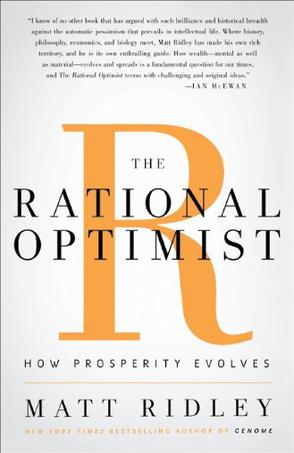
The Rational Optimist
Life is getting better—and at an accelerating rate. Food availability, income, and life span are up; disease, child mortality, and violence are down — all across the globe. Though the world is far from perfect, necessities and luxuries alike are getting cheaper; population growth is slowing; Africa is following Asia out of poverty; the Internet, the mobile phone, and container shipping are enriching people’s lives as never before. The pessimists who dominate public discourse insist that we will soon reach a turning point and things will start to get worse. But they have been saying this for two hundred years. Yet Matt Ridley does more than describe how things are getting better. He explains why. Prosperity comes from everybody working for everybody else. The habit of exchange and specialization—which started more than 100,000 years ago—has created a collective brain that sets human living standards on a rising trend. The mutual dependence, trust, and sharing that result are causes for hope, not despair. This bold book covers the entire sweep of human history, from the Stone Age to the Internet, from the stagnation of the Ming empire to the invention of the steam engine, from the population explosion to the likely consequences of climate change. It ends with a confident assertion that thanks to the ceaseless capacity of the human race for innovative change, and despite inevitable disasters along the way, the twenty-first century will see both human prosperity and natural biodiversity enhanced. Acute, refreshing, and revelatory, The Rational Optimist will change your way of thinking about the world for the better. -
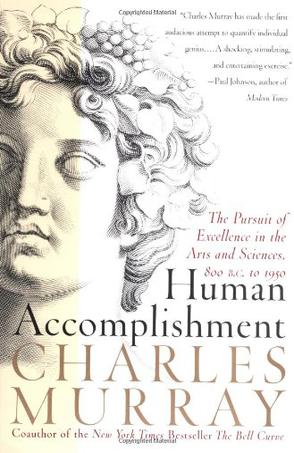
Human Accomplishment
A sweeping cultural survey reminiscent of Barzun's From Dawn to Decadence . "At irregular times and in scattered settings, human beings have achieved great things. Human Accomplishment is about those great things, falling in the domains known as the arts and sciences, and the people who did them.' So begins Charles Murray's unique account of human excellence, from the age of Homer to our own time. Employing techniques that historians have developed over the last century but that have rarely been applied to books written for the general public, Murray compiles inventories of the people who have been essential to the stories of literature, music, art, philosophy, and the sciences—a total of 4,002 men and women from around the world, ranked according to their eminence. The heart of Human Accomplishment is a series of enthralling descriptive chapters: on the giants in the arts and what sets them apart from the merely great; on the differences between great achievement in the arts and in the sciences; on the meta-inventions, 14 crucial leaps in human capacity to create great art and science; and on the patterns and trajectories of accomplishment across time and geography. Straightforwardly and undogmatically, Charles Murray takes on some controversial questions. Why has accomplishment been so concentrated in Europe? Among men? Since 1400? He presents evidence that the rate of great accomplishment has been declining in the last century, asks what it means, and offers a rich framework for thinking about the conditions under which the human spirit has expressed itself most gloriously. Eye-opening and humbling, Human Accomplishment is a fascinating work that describes what humans at their best can achieve, provides tools for exploring its wellsprings, and celebrates the continuing common quest of humans everywhere to discover truths, create beauty, and apprehend the good. -
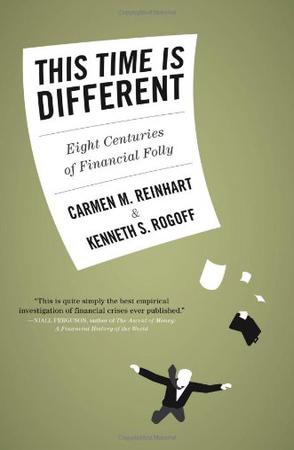
This Time Is Different
The authors use copious amounts of data ... to make the compelling case that any well-informed person should have seen the Great Recession coming. The essence of their book is that while financial crises come in different varieties, they are not mysteriously born of undersea earthquakes, but frequently occurring events that can be spotted and even controlled if politicians and regulators know what to look for. -- Devin Leonard New York Times Reinhart and Rogoff have compiled an impressive database, which covers eight centuries of government debt defaults from around the world. They have also collected statistics on inflation rates from every country where information is available and on banking crises and international capital flows over the past couple of centuries. This lengthy historical study gives what they call a 'panoramic view' of the unending cycle of boom and bust, showing how claims that 'this time is different' are invariably proven wrong... This Time Is Different doesn't simply explain what went wrong in our most recent crisis. This book also provides a roadmap of how things are likely to pan out in the years to come... This Time Is Different is an important addition to the literature of financial history. -- Edward Chancellor Wall Street Journal Professor Rogoff and his longtime collaborator Carmen Reinhart ... know more about the history of financial crises than anyone alive. The pair have just published their broad survey of financial crises, This Time is Different. In an era when most 'analysts' rely on maybe 30 or 40 years' worth of financial history--and then only that of the U.S.--the authors' knowledge of financial crises and government bond defaults going back to the Spanish empire and before offers a richer perspective. -- Brett Arends Wall Street Journal [E]ssential reading ... both for its originality and for the sobering patterns of financial behaviour it reveals. Economist The four most dangerous words in finance are 'this time is different.' Thanks to this masterpiece by Carmen Reinhart at the University of Maryland and Kenneth Rogoff of Harvard, no one can doubt this again... The authors have put an immense amount of work into collecting the data financial institutions needed if they were to have any chance of making quantitative risk management work. -- Martin Wolf Financial Times Everyone working on economic policy should own This Time is Different and open it for a bracing blast of sobriety when things seem to be going well. -- Greg Ip Washington Post [A] fine new history of financial debacles. -- Daniel Gross Newsweek Wouldn't it be nice to have $1,000 for every time a pundit proclaims an era of endless prosperity, consigning booms and busts to the dumpster of history? The next time you hear that canard (and you will) pour yourself a single malt and dip into Carmen M. Reinhart and Kenneth S. Rogoff's landmark study, This Time Is Different. Wherever you open the book, you'll find proof that debt-fueled expansions have ended in financial ruin for hundreds of years... The result is a visual history laid out in beguilingly simple graphs and tables, making the book both definitive--a must read for professors and investors--and accessible to a wider audience. -- James Pressley Bloomberg News Carmen Reinhart and Kenneth Rogoff have delivered a powerful and eloquent statement... Reinhart and Rogoff have done an extraordinary job in putting together statistics on government debt--a task that economic historians should have done long ago but shied away from because of the difficulties of defining 'government', which is often complex and multi-layered. -- Harold James The American Interest Unlike prior narrative accounts of market panics from such finance writers as Charles Kindleberger and Edward Chancellor, Reinhart and Rogoff give us a data-driven study that is global in sweep but also a model of clarity. The authors package their notably nonhysterical analysis of the latest crisis in a large, self-contained section of the book inviting harried readers to skip right ahead to it. -- Daniel Akst CNNMoney.com A tour de force of quantitative analysis covering financial crises affecting 66 countries over the past 800 years, the book identifies pre-crisis patterns that recur with eerie consistency. This Time is Different is a must-read for anyone on the lookout for canaries in coal mines. Barron's This is certainly one of the must-read books of the year. -- Arnold Kling Econlog.com Rogoff and Reinhart ... provide an eye-opening look at the cycles of boom and bust and how governments deal with those cycles. Arkansas Business [A] valuable new book. Idaho Statesman Having studied mountains of economic data during the past eight centuries, the authors insightfully point out the highly repetitive nature of financial crises resulted from a dangerous mix of hubris, euphoria and amnesia. Shanghai Daily -
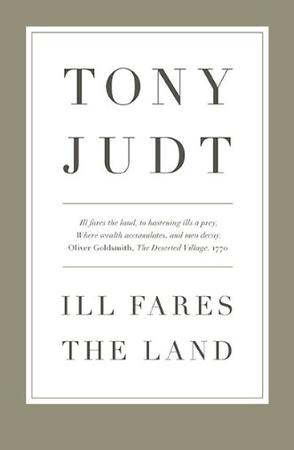
Ill Fares the Land
Something is profoundly wrong with the way we think about how we should live today. In Ill Fares The Land , Tony Judt, one of our leading historians and thinkers, reveals how we have arrived at our present dangerously confused moment. Judt masterfully crystallizes what we’ve all been feeling into a way to think our way into, and thus out of, our great collective dis-ease about the current state of things. As the economic collapse of 2008 made clear, the social contract that defined postwar life in Europe and America – the guarantee of a basal level of security, stability and fairness -- is no longer guaranteed; in fact, it’s no longer part of the common discourse. Judt offers the language we need to address our common needs, rejecting the nihilistic individualism of the far right and the debunked socialism of the past. To find a way forward, we must look to our not so distant past and to social democracy in action: to re-enshrining fairness over mere efficiency. Distinctly absent from our national dialogue, social democrats believe that the state can play an enhanced role in our lives without threatening our liberties. Instead of placing blind faith in the market—as we have to our detriment for the past thirty years—social democrats entrust their fellow citizens and the state itself. Ill Fares the Land challenges us to confront our societal ills and to shoulder responsibility for the world we live in. For hope remains. In reintroducing alternatives to the status quo, Judt reinvigorates our political conversation, providing the tools necessary to imagine a new form of governance, a new way of life. -
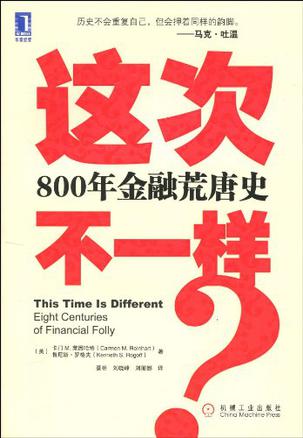
这次不一样?800年金融荒唐史
《这次不一样?(800年金融荒唐史)》用定量的语言讲述了以各种面目出现的金融危机的历史。想传递的基本信息很简单:我们曾经经历过。无论最近的金融狂热或金融危机看起来多么与众不同,都与其他国家或过去时期所经历的危机存在极多共同之处。有了何其相似和不乏先例这种认识,就使得我们朝着完善全球金融体系迈进了重要的一步,使我们能够降低未来危机的风险,也能更好地在危机来临之际妥善应对灾难。